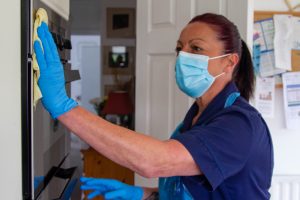Spotting the Signs
Posted: 3 March 2021

Time marches on. There is no doubt that Covid-19 has changed everything for everyone of all ages and walks of life, and accessibility to the elderly and the vulnerable in society for the past year has been impossible at worst and fraught with challenges at best.
How are your loved ones faring? Not only the old, but the disabled and challenged… As we work towards taking back some form of normality in our daily routines and meeting up with one another, we may notice differences in relatives, old and young, and it’s a good time to put things in place with a view to having an action plan should it be needed. .
Check in with them: How are they coping with everyday life? Are they happy and engaged, can you get a feel for their social life (whether or not you can be there in person) and a simple call or visit gives a snapshot of memory function, and you can take a look at hygiene, housekeeping, dexterity and so much more.
You might have that ‘wakeup call’ and notice some indications that loved ones aren’t quite the same. This can be more noticeable after a long period of time apart or having relied on phone/video contact rather than face-to-face visits for a while. Maybe they’re a little forgetful, have lost weight, are not as social as they used to be or even have cuts or bruises. These indicators are signs that they may need a little help with their everyday life.
If you have those concerns then it’s wise to act fast. Talk to them about it. Have a conversation with them and discuss some options… getting in specialists such as St Kath’s might be part of that, as will bringing in the wider family and, crucially, thinking ahead with a series of ‘What If’s?’ Safety, dignity, independence and contentment are the end goals, but a little fall can put all that into jeopardy.
As people grow older and develop age-related diseases two of the most common are the loss of mobility and cognition. Broad areas we know, but below are some things to look out for when assessing a loved one:
- Memory. As we get older our memory isn’t what it was. “Now what did I come in here for?” is a question anyone over fifty probably asks with some regularity! But it’s more profound loss, and more regular, that’s of concern. For example, repeatedly locking themselves out of the house, leaving the stove on or the bath overflowing… These might well need more formal investigation, and while no-one wants to think about dementia, early detection is the key to doing something about it.
- Dexterity and balance. Falling is a massive cause of injury in the elderly and in some cases a simple fall can have very serious consequences. As you get older your balance goes, and this makes falling one of the leading causes of injury in the over 65s. And don’t forget the emotional impact of a fall, the loss of confidence that leads your loved ones to avoid activities or social engagements for fear of falling. This in turn can lead to physical and psychological decline.
- Hygiene. OK, let’s go there, because we all know this is one of the first things that stands out when things start to go downhill. Clothes may start to look dishevelled and/or smelly, dentures not cleaned, bathing less regular or non existent and (hate to say it) check the loo…
- Housekeeping. Take a look around your loved one’s house and check if they are on top of the housework, it’s another of the first signs of not coping. Old or spoiled food, sell-by dates passed, rotten food in the fridge (yes…) lack of hoovering, cleaning, rubbish not emptied… all signs that home support may well be needed.
- Socialisation. Keeping up with friends and ex-colleagues? Any clubs or societies joined? Are they still driving? What about bingo, social clubs, cultural activities? Companionship is so very important, and as old people become isolated their carers can provide some of that, and we do. What is important is to ensure they have something to enjoy and look forward to every day.
There’s no shame in any of this, and we all need to do what we can to help. On a personal note I’ve experienced all this with both my parents and other family members, there is nothing bad or wrong with not coping, only in our response, as family, to that.
St Katherine’s Care has a team of wonderful home care workers and we would be happy to provide you with an assessment to understand the individual care required and how we can customise this to ensure your loved one’s needs are met today and prepared for the future.
Remember, if you are able to bring in support early you are helping them to remain independent and safe in their own home for longer.
